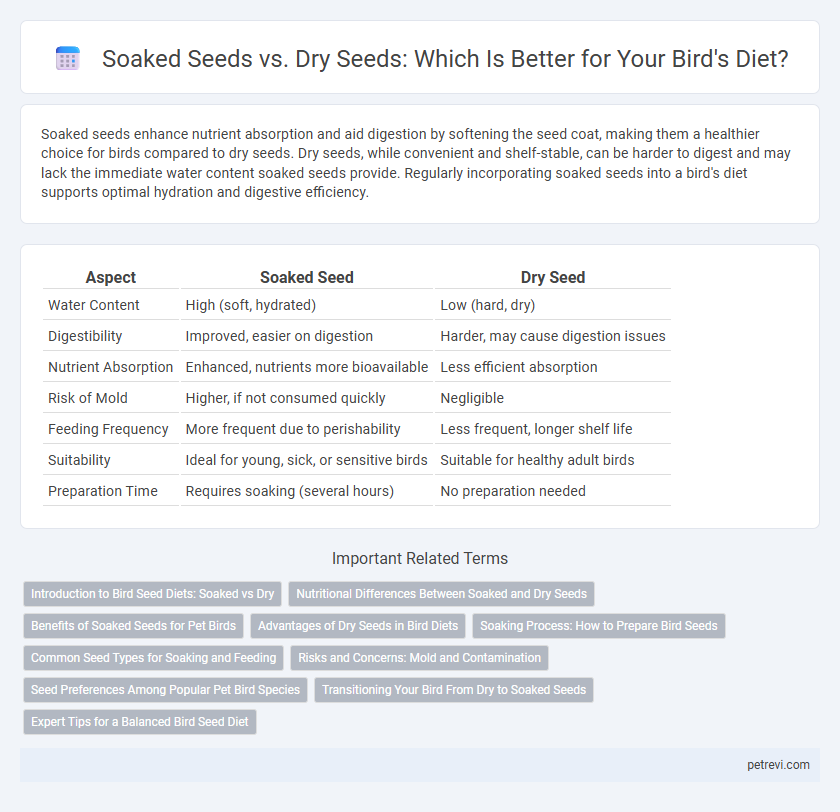Soaked seeds enhance nutrient absorption and aid digestion by softening the seed coat, making them a healthier choice for birds compared to dry seeds. Dry seeds, while convenient and shelf-stable, can be harder to digest and may lack the immediate water content soaked seeds provide. Regularly incorporating soaked seeds into a bird's diet supports optimal hydration and digestive efficiency.
Table of Comparison
| Aspect | Soaked Seed | Dry Seed |
|---|---|---|
| Water Content | High (soft, hydrated) | Low (hard, dry) |
| Digestibility | Improved, easier on digestion | Harder, may cause digestion issues |
| Nutrient Absorption | Enhanced, nutrients more bioavailable | Less efficient absorption |
| Risk of Mold | Higher, if not consumed quickly | Negligible |
| Feeding Frequency | More frequent due to perishability | Less frequent, longer shelf life |
| Suitability | Ideal for young, sick, or sensitive birds | Suitable for healthy adult birds |
| Preparation Time | Requires soaking (several hours) | No preparation needed |
Introduction to Bird Seed Diets: Soaked vs Dry
Soaked seeds enhance nutrient absorption and hydration for birds by softening outer shells and activating enzymes. Dry seeds provide natural crunch and longer shelf life, preserving essential oils and vitamins but may require more digestive effort. Balanced bird diets often incorporate both soaked and dry seeds to optimize health and digestion.
Nutritional Differences Between Soaked and Dry Seeds
Soaked seeds enhance nutrient availability by reducing anti-nutrients like phytic acid, which improves mineral absorption essential for bird health. The hydration process also activates enzymes and increases vitamin content, particularly B vitamins, promoting better digestion and energy metabolism. Conversely, dry seeds contain higher levels of anti-nutrients and require more digestive effort, potentially limiting nutrient uptake in avian diets.
Benefits of Soaked Seeds for Pet Birds
Soaked seeds enhance nutrient absorption by softening the seed coat, making vitamins and minerals more bioavailable for pet birds. They reduce the risk of crop impaction and bacterial growth, supporting better digestive health and hydration. Soaked seeds also encourage higher consumption and improve overall digestion, promoting active and healthy birds.
Advantages of Dry Seeds in Bird Diets
Dry seeds provide higher energy density and longer shelf life compared to soaked seeds, making them ideal for bird diets requiring sustained nutrition. Their low moisture content reduces the risk of mold and bacterial growth, promoting better digestive health in birds. Furthermore, dry seeds encourage natural foraging behavior, supporting birds' mental stimulation and physical activity.
Soaking Process: How to Prepare Bird Seeds
Soaking bird seeds enhances nutrient absorption by softening the seed coat and activating enzymes that increase digestibility. The soaking process involves rinsing seeds thoroughly, immersing them in warm water for 8-12 hours, and draining before feeding to prevent mold growth. Properly soaked seeds reduce choking hazards and promote healthy digestion in birds compared to dry seeds.
Common Seed Types for Soaking and Feeding
Soaked seeds, such as millet, sunflower, and safflower, offer enhanced digestibility and nutrient absorption for birds compared to dry seeds. Soaking reduces anti-nutrients and activates enzymes, promoting better gut health and energy levels. Common seed types ideal for soaking include chia, flax, and pumpkin seeds, which soften significantly and release essential fatty acids beneficial for avian diets.
Risks and Concerns: Mold and Contamination
Soaked seeds pose a higher risk of mold growth and bacterial contamination due to retained moisture, which can lead to digestive issues and respiratory infections in birds. Dry seeds, while less prone to spoilage, may lack the added hydration benefits but significantly reduce the risk of harmful pathogens. Proper storage and timely feeding are essential to minimize these risks and ensure bird health.
Seed Preferences Among Popular Pet Bird Species
Soaked seeds enhance digestibility and nutrient absorption for species like finches, canaries, and budgerigars, which prefer softer seeds over dry ones. Parrots and cockatiels may favor a mix, as soaked seeds help reduce the risk of choking and encourage water intake, supporting overall health. Seed preference varies by species, emphasizing the importance of tailoring diets to individual bird nutritional needs and natural feeding behaviors.
Transitioning Your Bird From Dry to Soaked Seeds
Soaked seeds enhance nutrient absorption and improve digestion compared to dry seeds, making them ideal for gradually transitioning your bird's diet. Begin by mixing a small proportion of soaked seeds with dry seeds, increasing the soaked portion over one to two weeks to prevent digestive upset. Consistent hydration and monitoring for any adverse reactions ensure a smooth dietary shift that supports optimal bird health and vitality.
Expert Tips for a Balanced Bird Seed Diet
Soaked seeds improve nutrient absorption and hydration, reducing the risk of digestive issues commonly linked to dry seeds in bird diets. Experts recommend alternating soaked and dry seeds to maintain optimal gut health and promote balanced nutrition by enhancing enzyme activity and microbial balance. Including a variety of soaked seeds such as millet, sunflower, and safflower ensures birds receive essential amino acids, vitamins, and minerals for vitality and growth.
Soaked Seed vs Dry Seed for Bird Diet Infographic

 petrevi.com
petrevi.com